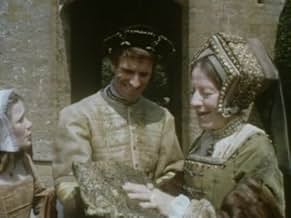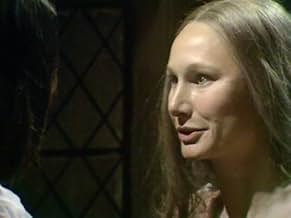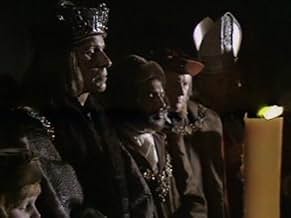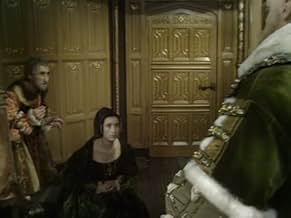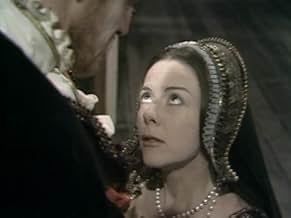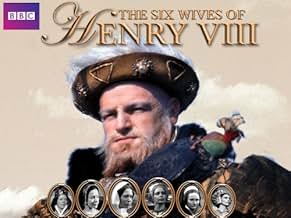IMDb-BEWERTUNG
8,4/10
1522
IHRE BEWERTUNG
Füge eine Handlung in deiner Sprache hinzuA six-episode dramatization of Henry VIII's relationships with each of his six wives. Each episode is devoted to one wife, and is a complete play in itself.A six-episode dramatization of Henry VIII's relationships with each of his six wives. Each episode is devoted to one wife, and is a complete play in itself.A six-episode dramatization of Henry VIII's relationships with each of his six wives. Each episode is devoted to one wife, and is a complete play in itself.
- 1 Primetime Emmy gewonnen
- 7 Gewinne & 8 Nominierungen insgesamt
Folgen durchsuchen
Empfohlene Bewertungen
The best TV miniseries I've ever seen by far. Originally a BBC presentation, it became something of a pop culture phenomenon here in the summer of 1971, when, edited and with a more elegant introduction, it was presented on six Sunday nights. What's best in it is what's most important- the characterization by the six different playwrights of that monstrous old charmer, Henry VIII, and the performance(s) of Keith Michell in the role. I'll give my comments wife by wife. (The title of each episode is the name of the wife.)
CATHERINE OF ARAGON (A) The proximate cause of the English Reformation, the daughter of Ferdinand and Isabella of Spain who had been briefly married to Henry's older brother, whom he married with the necessary papal dispensation, and later wanted to dump because she didn't produce a male heir, which led to all the trouble with Rome. The series gets off to a rocky start. It was a daring ploy of the author to be deliberately tedious in the depiction of the unnoteworthy trials of the young "princess dowager" so as to draw a sharp ironic parallel to the world-shaking trials of the OLD "princess dowager." The satisfaction you feel in getting the point makes up for your initial impatience. All of the wives give fine performances; Annette Crosbie's is one of two which are as great as Michell's. She does full justice to a very great lady. Complaints: her old-age make-up is way overdone (she looks 60-70 instead of 40-50)and this is the only episode compromised by a gratingly poor performance (you'll know whom I mean).
ANNE BOLEYN (A-) Interestingly, the one part of Henry's life which is well-known, his romance with Anne Boleyn, is dispatched here in a minute-long opening interlude. There are some serious weaknesses in the script. The phraseology is "off" a lot- too modern, too soap operatic. ("Love is a most Complete Experience...") It puts its emotional climax (Anne's trial for adultery) at the mid point and then has to trump up unlikely, pointless scenes between the doomed Queen and the Henry's weak yes-man Archbishop Cranmer which come off as actors stalling on a stage because the hands are having trouble wheeling out the block. Henry is reduced to a supporting role in this one and is purely the villain of the piece. The previous Catherine and this Anne are the only wives whose personalities and words have come through in the pages of history; what's most admirable here (and least soap operatic) is that neither the playwright nor the actress (the late Dorothy Tutin)try to gloss over the cruelty and arrogance of the legendary Hussy, and even seem to want to convey the idea that in a sense getting thrown in the Tower and having her head chopped off were the best things that ever happened to her, almost a blessed relief. The supporting players are generally superb in all episodes. Here Anne's brother George and the gentle coward Cranmer are stand-outs.
JANE SEYMOUR (A+) Television at its finest. All but sheer perfection in every way. By far the richest in drama and historical analysis. The playwright ingeniously parlays the little that is known about the sweet country girl (the original Plain Jane)who gave Henry his all-important prince and then quietly crept into her tomb, into an unforgettably touching look at Innocence and Goodness defiled and destroyed even as it's healing and helping (to some degree) Guilt and Badness. The psychological and moral depth matches the emotional- a rare triumph. The portrait it draws of Henry is the most balanced, and Anne Stallybrass is the other actress who attains magnificence. Okay, one tiny flaw: the merry-making scenes are too long.
ANNE OF CLEVES (A-) In the series as in life, a little comedy relief in Henry's ghastly marital career. Elvi Hale is a delight as the supposedly ungainly German princess whom the now grotesque and dilapidated Henry married to deal an alliance with the European Protestants. All that's known of the real Anne is that she was considered ugly and gauche but loved even by Henry (after dumping her in short order) for her simple good nature. Here the "joke" is that behind the scenes Anne is a brilliant political chess player who only plays dumb when expedient. But the good nature is still there, along with a rather anachronistic conviction that "comforting a hurt child is more important than squabbles between Churches", making her probably the only one of the six wives most modern people could like and identify with. Biggest problem: the "informational dialogue" is poured on too thick. The fact that Miss Hale is not just not ugly but actually the only wife who comes close to being beautiful, may be part of the "joke": we have portraits of all six real life wives and she, the "ugly" one, is generally thought to be the only pretty one. The simple sadness of the last shot is unforgettable.
CATHERINE HOWARD (A-) Michell shines as the wreck of his dashing and heroic former self trying to drum up a second wind in his blubbery old hulk when he falls head over heels for a pretty lass whom he makes Queen of England without checking her references... The real Catherine was just a vain and frivolous little ninny who led a sordid life and came to a bad end: to tease a Legend out of this pitiful footnote here Catherine has all the cunning and craft and steely will of Cleopatra and Scarlett O'Hara, and all the rhetorical grandeur of Antigone. The artifice doesn't quite jibe with the facts even as shown. Angela Pleasance is excellent as the witchy little wanton; appropriately, she's attractively nubile but on closer look really not even that pretty. It's a detail which nicely highlights the Die Young/Stay Young Eternally theme. Compelling, but a little too nasty for its own good. The scene in which Catherine banishes the court jester is a nice touch (the clown as sinister symbol of Fate).
CATHERINE PARR (A)The most plodding of the scripts, the least thematically engaging and most history bookish and episodic, so it's a good thing that the dialogue is especially witty and incisive. Another great lady among the six wives in real life, and Rosalie Crutchley does a fine job of projecting her intelligence, humor, kindliness, and honesty, as well as her mortal terror when despite all her golden virtues she almost goes the way of the first Anne and the next-to-last Catherine because of her one fault: she doesn't know when to keep her mouth shut on the subject of Religion in earshot of a husband who made up his own religion up as he went along and had a habit of killing those who wouldn't or couldn't keep up with the developments. Scene of King and Kate's first meeting one of best in the series.
CATHERINE OF ARAGON (A) The proximate cause of the English Reformation, the daughter of Ferdinand and Isabella of Spain who had been briefly married to Henry's older brother, whom he married with the necessary papal dispensation, and later wanted to dump because she didn't produce a male heir, which led to all the trouble with Rome. The series gets off to a rocky start. It was a daring ploy of the author to be deliberately tedious in the depiction of the unnoteworthy trials of the young "princess dowager" so as to draw a sharp ironic parallel to the world-shaking trials of the OLD "princess dowager." The satisfaction you feel in getting the point makes up for your initial impatience. All of the wives give fine performances; Annette Crosbie's is one of two which are as great as Michell's. She does full justice to a very great lady. Complaints: her old-age make-up is way overdone (she looks 60-70 instead of 40-50)and this is the only episode compromised by a gratingly poor performance (you'll know whom I mean).
ANNE BOLEYN (A-) Interestingly, the one part of Henry's life which is well-known, his romance with Anne Boleyn, is dispatched here in a minute-long opening interlude. There are some serious weaknesses in the script. The phraseology is "off" a lot- too modern, too soap operatic. ("Love is a most Complete Experience...") It puts its emotional climax (Anne's trial for adultery) at the mid point and then has to trump up unlikely, pointless scenes between the doomed Queen and the Henry's weak yes-man Archbishop Cranmer which come off as actors stalling on a stage because the hands are having trouble wheeling out the block. Henry is reduced to a supporting role in this one and is purely the villain of the piece. The previous Catherine and this Anne are the only wives whose personalities and words have come through in the pages of history; what's most admirable here (and least soap operatic) is that neither the playwright nor the actress (the late Dorothy Tutin)try to gloss over the cruelty and arrogance of the legendary Hussy, and even seem to want to convey the idea that in a sense getting thrown in the Tower and having her head chopped off were the best things that ever happened to her, almost a blessed relief. The supporting players are generally superb in all episodes. Here Anne's brother George and the gentle coward Cranmer are stand-outs.
JANE SEYMOUR (A+) Television at its finest. All but sheer perfection in every way. By far the richest in drama and historical analysis. The playwright ingeniously parlays the little that is known about the sweet country girl (the original Plain Jane)who gave Henry his all-important prince and then quietly crept into her tomb, into an unforgettably touching look at Innocence and Goodness defiled and destroyed even as it's healing and helping (to some degree) Guilt and Badness. The psychological and moral depth matches the emotional- a rare triumph. The portrait it draws of Henry is the most balanced, and Anne Stallybrass is the other actress who attains magnificence. Okay, one tiny flaw: the merry-making scenes are too long.
ANNE OF CLEVES (A-) In the series as in life, a little comedy relief in Henry's ghastly marital career. Elvi Hale is a delight as the supposedly ungainly German princess whom the now grotesque and dilapidated Henry married to deal an alliance with the European Protestants. All that's known of the real Anne is that she was considered ugly and gauche but loved even by Henry (after dumping her in short order) for her simple good nature. Here the "joke" is that behind the scenes Anne is a brilliant political chess player who only plays dumb when expedient. But the good nature is still there, along with a rather anachronistic conviction that "comforting a hurt child is more important than squabbles between Churches", making her probably the only one of the six wives most modern people could like and identify with. Biggest problem: the "informational dialogue" is poured on too thick. The fact that Miss Hale is not just not ugly but actually the only wife who comes close to being beautiful, may be part of the "joke": we have portraits of all six real life wives and she, the "ugly" one, is generally thought to be the only pretty one. The simple sadness of the last shot is unforgettable.
CATHERINE HOWARD (A-) Michell shines as the wreck of his dashing and heroic former self trying to drum up a second wind in his blubbery old hulk when he falls head over heels for a pretty lass whom he makes Queen of England without checking her references... The real Catherine was just a vain and frivolous little ninny who led a sordid life and came to a bad end: to tease a Legend out of this pitiful footnote here Catherine has all the cunning and craft and steely will of Cleopatra and Scarlett O'Hara, and all the rhetorical grandeur of Antigone. The artifice doesn't quite jibe with the facts even as shown. Angela Pleasance is excellent as the witchy little wanton; appropriately, she's attractively nubile but on closer look really not even that pretty. It's a detail which nicely highlights the Die Young/Stay Young Eternally theme. Compelling, but a little too nasty for its own good. The scene in which Catherine banishes the court jester is a nice touch (the clown as sinister symbol of Fate).
CATHERINE PARR (A)The most plodding of the scripts, the least thematically engaging and most history bookish and episodic, so it's a good thing that the dialogue is especially witty and incisive. Another great lady among the six wives in real life, and Rosalie Crutchley does a fine job of projecting her intelligence, humor, kindliness, and honesty, as well as her mortal terror when despite all her golden virtues she almost goes the way of the first Anne and the next-to-last Catherine because of her one fault: she doesn't know when to keep her mouth shut on the subject of Religion in earshot of a husband who made up his own religion up as he went along and had a habit of killing those who wouldn't or couldn't keep up with the developments. Scene of King and Kate's first meeting one of best in the series.
This series - and can you imagine the BBC financing and supporting a nine-hour historical drama series these days? - focuses on one of the six wives each episode, an interesting approach which comes off better in some instalments than others. Still, what is here is excellent - and far better than the ridiculously truncated film which followed a few years later.
Keith Michell as Henry. What more can I add to the praise which has already been put forward? He is excellent in every episode; we see Henry as a complex character who at times can cause us to sympathise with his predicament. The writing of this series is tight and believable, and the supporting characters are solid. This always helps move a series along when many supporting players are there throughout. Of particular note are Patrick Troughton as Norfolk, Bernard Hepton as Cranmer, and Sheila Burrell as Lady Rochford.
Of the six wives, all are excellent in their own ways. Katherine of Aragon's story is rushed, but Annette Crosbie does her best and is both memorable and pathetic ... Dorothy Tutin as Anne Boleyn is more fiery but the trial scene is truly regal and gives a different perspective ... Anne Stallybrass as Jane Seymour is sweet, pious, and just a little bit cunning (and that episode, largely in flashback as Jane lies sick to death at her son's christening, is well done) ... Elvi Hale as Anne of Cleves is extremely convincing, and her episode is full of intrigue ... Catherine Howard, as played by Angela Pleasance, is all gloss and no substance, but you still feel for her as she goes headlong to her fate without recognition ... and Rosalie Crutchley as Katharine Parr is a dull old crow in black, widow of old men, who at first resents her lot and then comes to respect and love the sick king.
This series really is remarkable. I would never get bored watching it - and eventually, it led to another top-class BBC drama, Elizabeth R, using some of the same cast and moving the story through the reigns of Edward VI, Mary I, and Elizabeth I herself.
Keith Michell as Henry. What more can I add to the praise which has already been put forward? He is excellent in every episode; we see Henry as a complex character who at times can cause us to sympathise with his predicament. The writing of this series is tight and believable, and the supporting characters are solid. This always helps move a series along when many supporting players are there throughout. Of particular note are Patrick Troughton as Norfolk, Bernard Hepton as Cranmer, and Sheila Burrell as Lady Rochford.
Of the six wives, all are excellent in their own ways. Katherine of Aragon's story is rushed, but Annette Crosbie does her best and is both memorable and pathetic ... Dorothy Tutin as Anne Boleyn is more fiery but the trial scene is truly regal and gives a different perspective ... Anne Stallybrass as Jane Seymour is sweet, pious, and just a little bit cunning (and that episode, largely in flashback as Jane lies sick to death at her son's christening, is well done) ... Elvi Hale as Anne of Cleves is extremely convincing, and her episode is full of intrigue ... Catherine Howard, as played by Angela Pleasance, is all gloss and no substance, but you still feel for her as she goes headlong to her fate without recognition ... and Rosalie Crutchley as Katharine Parr is a dull old crow in black, widow of old men, who at first resents her lot and then comes to respect and love the sick king.
This series really is remarkable. I would never get bored watching it - and eventually, it led to another top-class BBC drama, Elizabeth R, using some of the same cast and moving the story through the reigns of Edward VI, Mary I, and Elizabeth I herself.
I first saw this BBC production at 13 in 1971, and was simply fascinated. I have seen it several times since, and it's always fresh and interesting to watch. Keith Mitchell is excellent as Henry VIII, and I found no fault with the acting or history of the series. Well-cast, well-acted. I must say that my favorite episodes were Dorothy Tutin as Anne Boleyn and the very unfortunate young Katherine Howard, played by Angela Pleasence. I was surprised that she is the daughter of of Donald Pleasance. All of the episodes are outstanding, and are educational as well. Keith Mitchell plays Henry the VIII with all the conceited, bombastic, loving, hating and self-indulging qualities that history describes him as having. A must-see for lovers of drama, romance, and English History. 10 out of 10 stars easily.
I have seen this series many times and enjoy it immensely every time I see it. I have read a number of biographies of Henry VII and this series is the most accurate portrayal of Henry VIII I have seen, making him a sympathetic character in spite of the way he treated some of his wives (in contrast, "The Private Life of Henry VIII," with Charles Laughton as Henry, is absolutely ludicrous in its portrayal of Henry and his wives). Watching this series gives one a good understanding of how a king could go through six wives, having two of them executed and one driven to an early death through mistreatment. Yet he is never exactly hero or villain, he is portrayed as a human being, who only once went into a marriage that was not for love, and quickly got out of it (through annulment). Anyone who is interested in the history of England's monarchy should enjoy this series. And a good follow up series is "Elizabeth R", with Glenda Jackson playing the title role (quite excellently).
Impeccable in casting, sets, dialogue, and period feel. All of the principals are magnificent; but the actors who play Stephen Gardiner and Robert Barnes are simply extraordinary. The much-maligned Keith Michell is still the best Henry this century, easily brushing aside Robert Shaw, Richard Burton, and Charles Laughton. Michell's combination of vanity, insecurity, overweening machismo, and determination to stay top dog at all costs is painful but fascinating to watch. This TV series does full justice to all facets of the Tudor period; best of all, it reveals extra magical touches with each re-viewing. Which means, in short, that this is a video which you should buy, rather than rent.
Wusstest du schon
- WissenswertesKeith Michell was one hundred eighty-eight centimeters (six feet one inch) tall, the same height as the real Henry VIII.
- VerbindungenFeatured in The 24th Annual Primetime Emmy Awards (1972)
Top-Auswahl
Melde dich zum Bewerten an und greife auf die Watchlist für personalisierte Empfehlungen zu.
- How many seasons does The Six Wives of Henry VIII have?Powered by Alexa
Details
Zu dieser Seite beitragen
Bearbeitung vorschlagen oder fehlenden Inhalt hinzufügen

Oberste Lücke
By what name was Die sechs Frauen Heinrich VIII (1970) officially released in India in English?
Antwort
